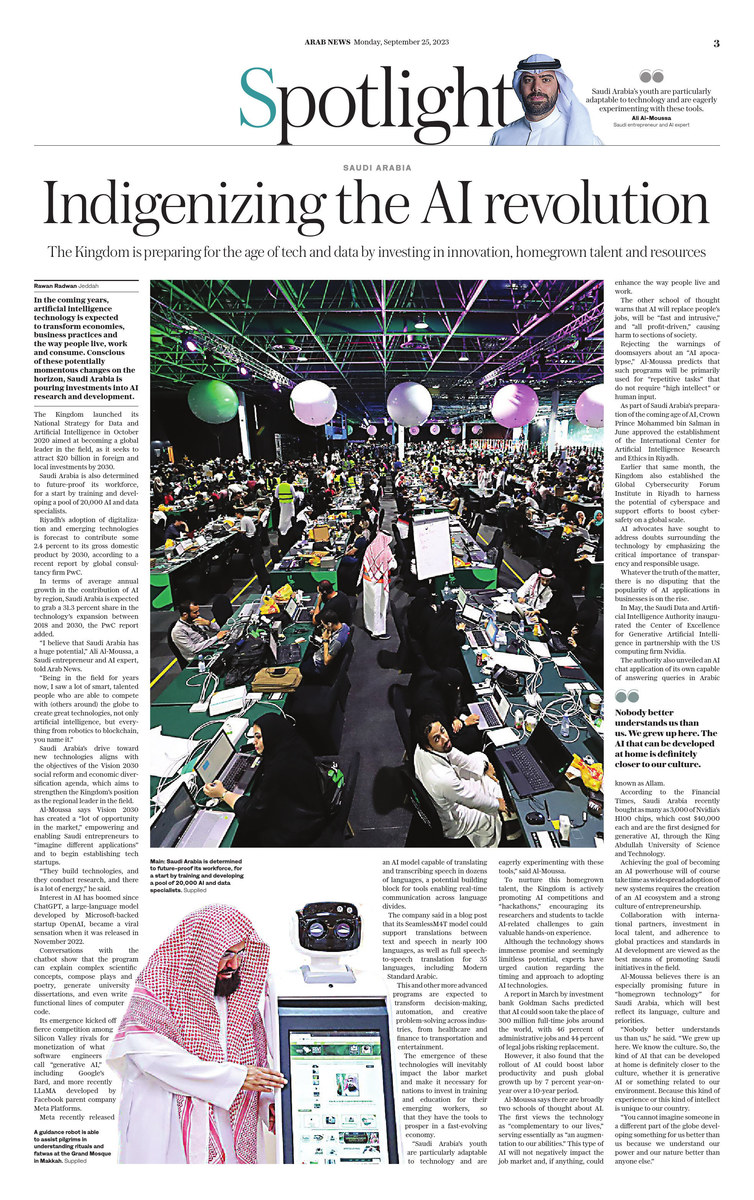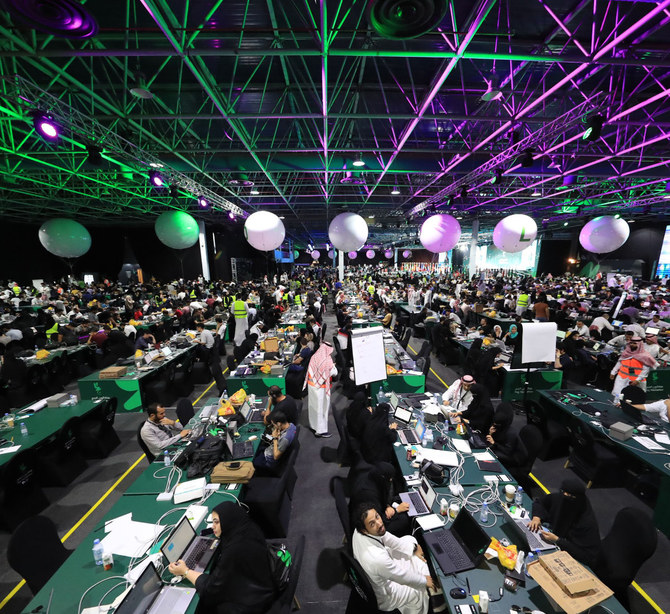JEDDAH: In the coming years, artificial intelligence technology is expected to transform economies, business practices and the way people live, work and consume. Conscious of these potentially momentous changes on the horizon, Saudi Arabia is pouring investments into AI research and development.
The Kingdom launched its National Strategy for Data and Artificial Intelligence in October 2020 aimed at becoming a global leader in the field, as it seeks to attract $20 billion in foreign and local investments by 2030.
Saudi Arabia is also determined to future-proof its workforce, for a start by training and developing a pool of 20,000 AI and data specialists.
Riyadh’s adoption of digitalization and emerging technologies is forecast to contribute some 2.4 percent to its gross domestic product by 2030, according to a recent report by global consultancy firm PwC.
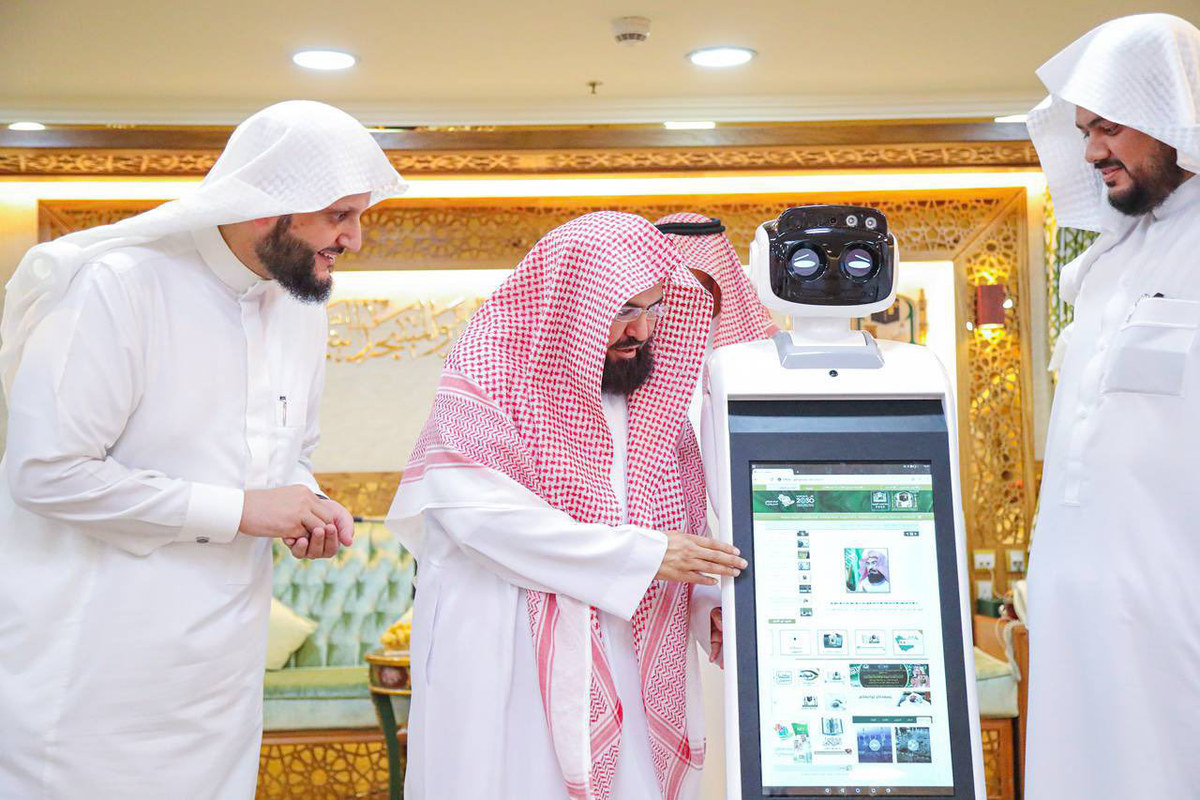
In this file picture, the chief of the General Presidency for the Two Holy Mosques, Abdul-Rahman al-Sudais, is shown inaugurating the “Information” robot, which would be available in the Grand Mosque and will provide visitors with general information, lectures, lessons, Khutbahs and information about imams and muadhins. (Courtesy: General Presidency of Haramain)
In terms of average annual growth in the contribution of AI by region, Saudi Arabia is expected to grab a 31.3 percent share in the technology’s expansion between 2018 and 2030, the PwC report added.
“I believe that Saudi Arabia has a huge potential,” Ali Al-Moussa, a Saudi entrepreneur and AI expert, told Arab News.
“Being in the field for years now, I saw a lot of smart, talented people who are able to compete with (others around) the globe to create great technologies, not only artificial intelligence, but everything from robotics to blockchain, you name it.”
Saudi Arabia’s drive toward new technologies aligns with the objectives of the Vision 2030 social reform and economic diversification agenda, which aims to strengthen the Kingdom’s position as the regional leader in the field.
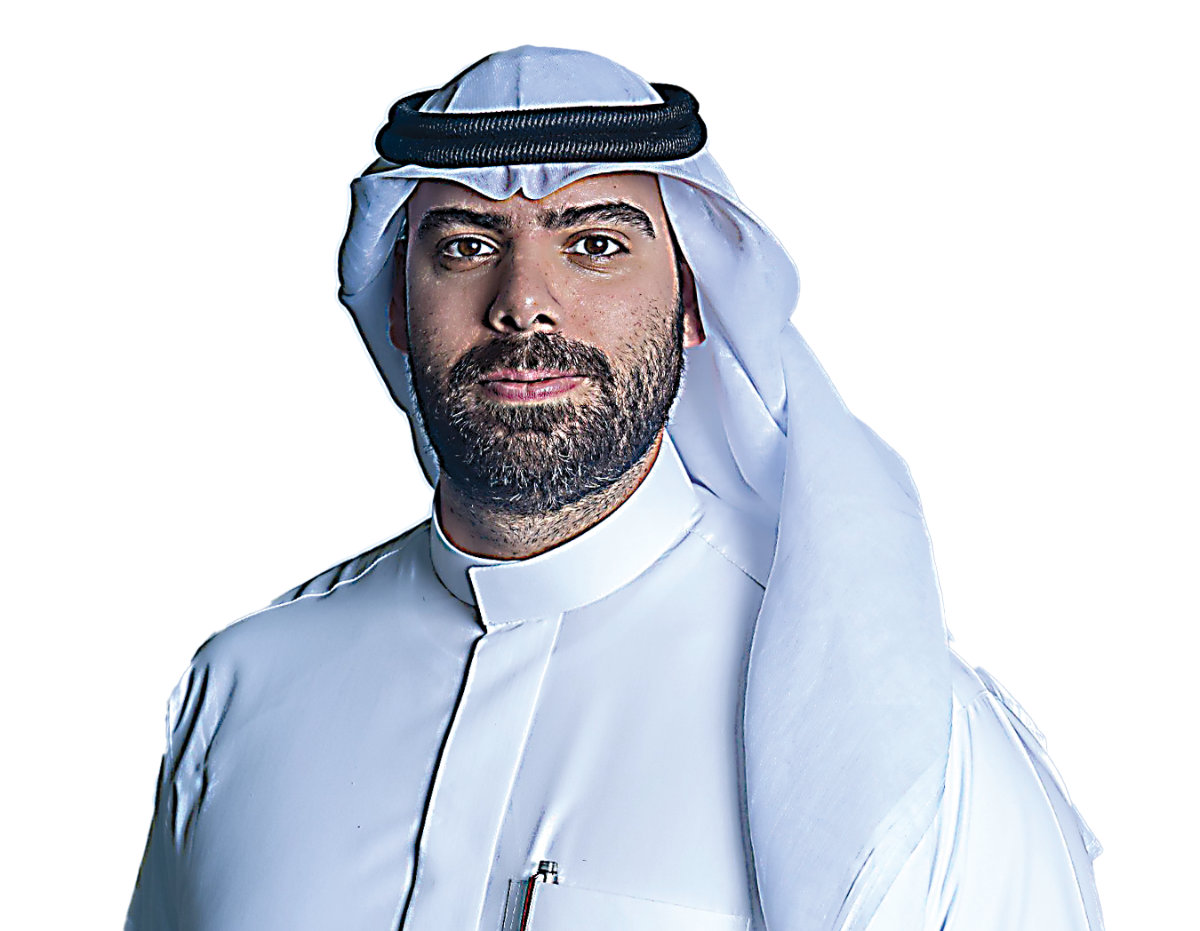
Saudi Arabia’s youth are particularly adaptable to technology and are eagerly experimenting with these tools, says Saudi entrepreneur and AI expert Ali Almussa. (Supplied)
Al-Moussa says Vision 2030 has created a “lot of opportunity in the market,” empowering and enabling Saudi entrepreneurs to “imagine different applications” and to begin establishing tech startups.
“They build technologies, and they conduct research, and there is a lot of energy,” he said.
Interest in AI has boomed since ChatGPT, a large-language model developed by Microsoft-backed startup OpenAI, became a viral sensation when it was released in November 2022.
Conversations with the chatbot show that the program can explain complex scientific concepts, compose plays and poetry, generate university dissertations, and even write functional lines of computer code.
Its emergence kicked off fierce competition among Silicon Valley rivals for monetization of what software engineers call “generative AI,” including Google’s Bard, and more recently LLaMA developed by Facebook parent company Meta Platforms.
Meta recently released an AI model capable of translating and transcribing speech in dozens of languages, a potential building block for tools enabling real-time communication across language divides.
The company said in a blog post that its SeamlessM4T model could support translations between text and speech in nearly 100 languages, as well as full speech-to-speech translation for 35 languages, including Modern Standard Arabic.
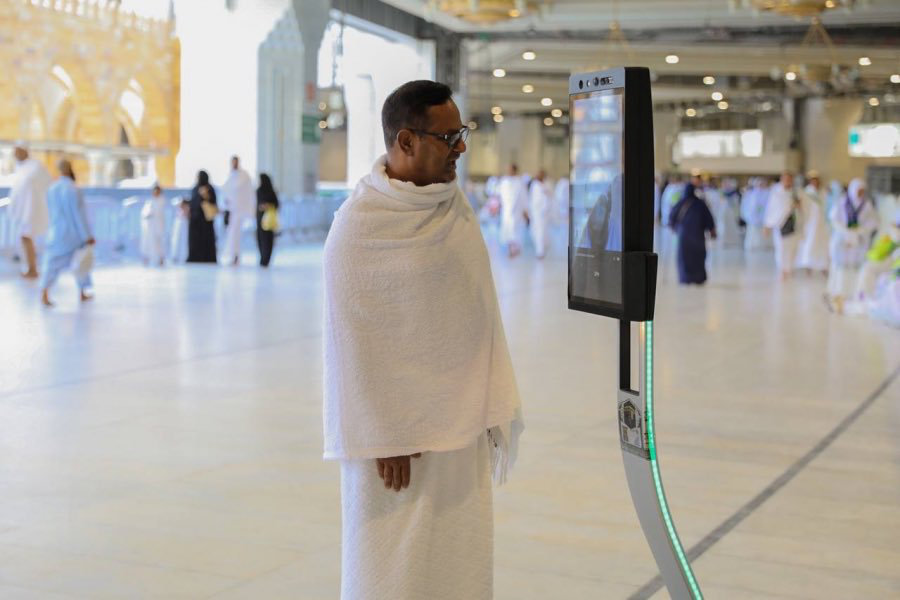
A “guidance robot” has been developed to assist pilgrims and Umrah performers in understanding rituals and fatwas. (Supplied)
This and other more advanced programs are expected to transform decision-making, automation, and creative problem-solving across industries, from healthcare and finance to transportation and entertainment.
The emergence of these technologies will inevitably impact the labor market and make it necessary for nations to invest in training and education for their emerging workers, so that they have the tools to prosper in a fast-evolving economy.
“Saudi Arabia’s youth are particularly adaptable to technology and are eagerly experimenting with these tools,” said Al-Moussa.
To nurture this homegrown talent, the Kingdom is actively promoting AI competitions and “hackathons,” encouraging its researchers and students to tackle AI-related challenges to gain valuable hands-on experience.
Although the technology shows immense promise and seemingly limitless potential, experts have urged caution regarding the timing and approach to adopting AI technologies.
A report in March by investment bank Goldman Sachs predicted that AI could soon take the place of 300 million full-time jobs around the world, with 46 percent of administrative jobs and 44 percent of legal jobs risking replacement.
However, it also found that the rollout of AI could boost labor productivity and push global growth up by 7 percent year-on-year over a 10-year period.
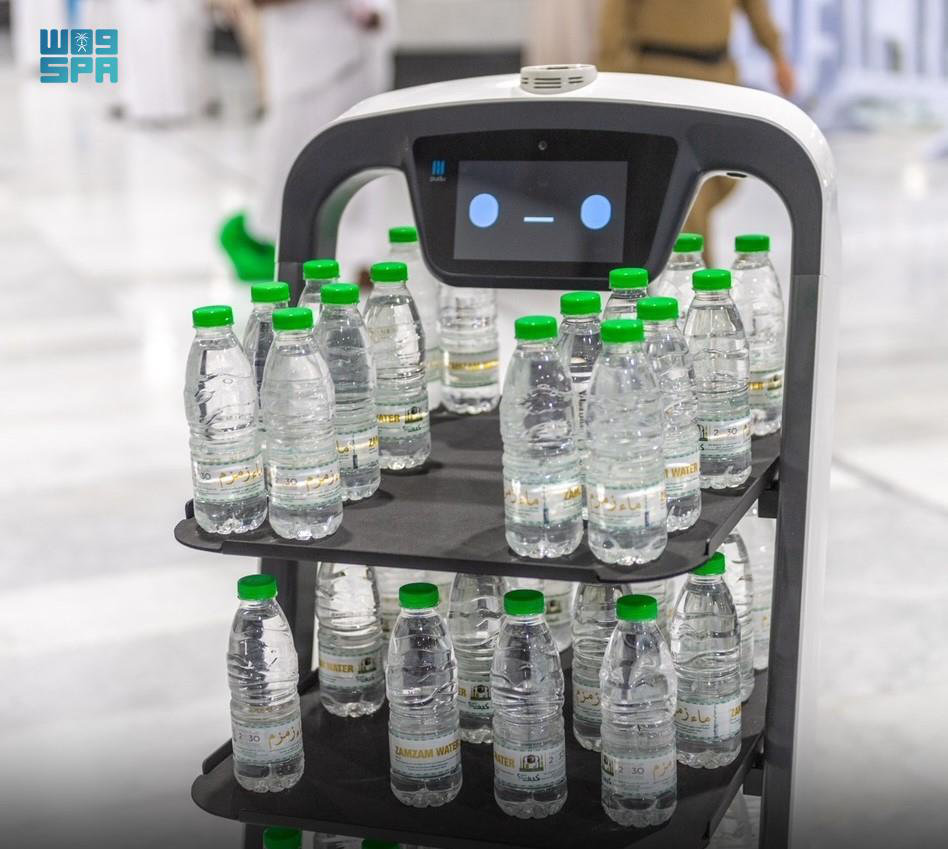
Equipped with upper and lower cameras, specialized Zamzam distributing robots with laser sensors help it avoid any surrounding obstacles. (FILE/General Presidency of Haramain)
Al-Moussa says there are broadly two schools of thought about AI. The first views the technology as “complementary to our lives,” serving essentially as “an augmentation to our abilities.” This type of AI will not negatively impact the job market and, if anything, could enhance the way people live and work.
The other school of thought warns that AI will replace people’s jobs, will be “fast and intrusive,” and “all profit-driven,” causing harm to sections of society.
Rejecting the warnings of doomsayers about an “AI apocalypse,” Al-Moussa predicts that such programs will be primarily used for “repetitive tasks” that do not require “high intellect” or human input.
As part of Saudi Arabia’s preparation of the coming age of AI, Crown Prince Mohammed bin Salman in June approved the establishment of the International Center for Artificial Intelligence Research and Ethics in Riyadh.
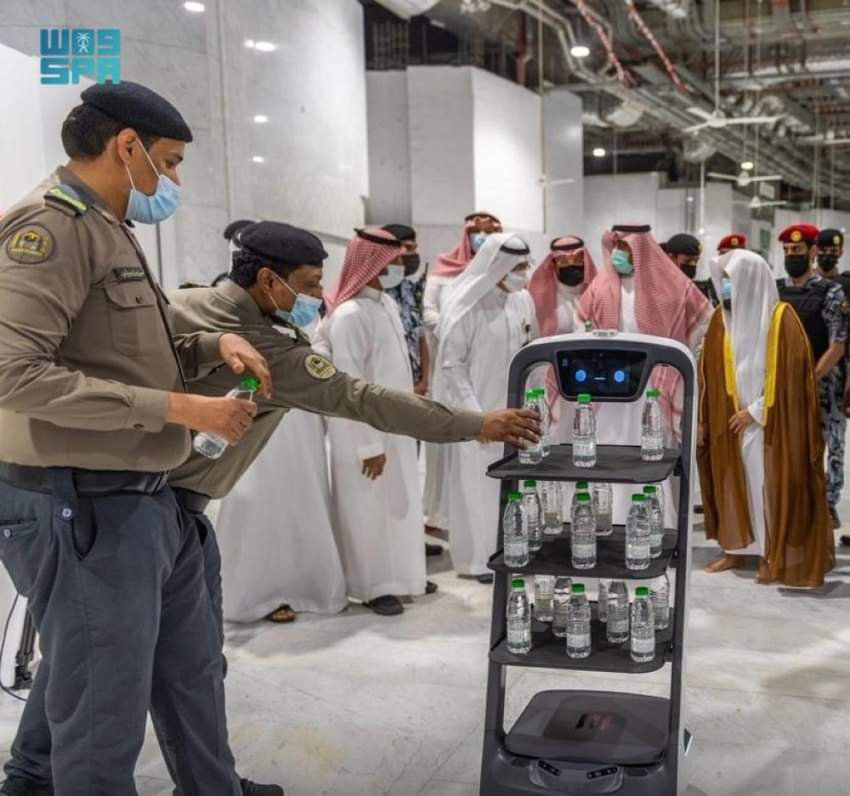
Introduced amid covid-19 pandemic, specialized robots roam the grounds of the Two Holy mosques distribute Zamzam water. (FILE/General Presidency of Haramain)
Earlier that same month, the Kingdom also established the Global Cybersecurity Forum Institute in Riyadh to harness the potential of cyberspace and support efforts to boost cybersafety on a global scale.
AI advocates have sought to address doubts surrounding the technology by emphasizing the critical importance of transparency and responsible usage.
Whatever the truth of the matter, there is no disputing that the popularity of AI applications in businesses is on the rise.
In May, the Saudi Data and Artificial Intelligence Authority inaugurated the Center of Excellence for Generative Artificial Intelligence in partnership with the US computing firm Nvidia.
The authority also unveiled an AI chat application of its own capable of answering queries in Arabic known as Allam.
According to the Financial Times, Saudi Arabia recently bought as many as 3,000 of Nvidia’s H100 chips, which cost $40,000 each and are the first designed for generative AI, through the King Abdullah University of Science and Technology.
Achieving the goal of becoming an AI powerhouse will of course take time as widespread adoption of new systems requires the creation of an AI ecosystem and a strong culture of entrepreneurship.
Collaboration with international partners, investment in local talent, and adherence to global practices and standards in AI development are viewed as the best means of promoting Saudi initiatives in the field.
Al-Moussa believes there is an especially promising future in “homegrown technology” for Saudi Arabia, which will best reflect its language, culture and priorities.
“Nobody better understands us than us,” he said. “We grew up here. We know the culture. So, the kind of AI that can be developed at home is definitely closer to the culture, whether it is generative AI or something related to our environment. Because this kind of experience or this kind of intellect is unique to our country.
“You cannot imagine someone in a different part of the globe developing something for us better than us because we understand our power and our nature better than anyone else.”
